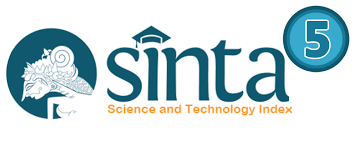Konsekuensi Work From Home Terhadap Organizational Identification pada Karyawan Perusahaan Handtools di Jakarta
Abstract
Pandemi COVID-19 merupakan titik awal penerapan Work From Home bagi perusahaan yang ada di Indonesia. Hal tersebut bagian salah satu kebijakan yang diusulkan pemerintah untuk dapat memutus rantai penyebaran virus Covid-19 di lingkungan para pekerja kantoran. Dalam keadaan ini, perusahaan harus berusaha untuk tetap dapat memberikan rasa Organizational Identification untuk setiap karyawannya. Dimana Identifikasi ini dapat membuat individu membedakan antara diri mereka dengan individu lain dalam kelompok mereka.
Tujuan dari penelitian ini adalah untuk menganalisis konsekuensi Work From Home terhadap Organizational Identification pada karyawan Perusahaan Handtools di Jakarta. Pengambilan sampel dengan menggunakan Teknik Purposive Sampling, sampel yang terkumpul sebanyak 167 karyawan. Metode analisis yang digunakan dengan menggunakan Structural Equation Model (SEM).
Hasil pengujian hipotesis dalam penelitan ini menunjukan Work frome home berpengaruh positif dan signifikan terhadap Work Life Balance, Work Life Balance berpengaruh positif dan signifikan terhadap Job Satisfaction, Job Satisfaction berpengaruh positif dan signifikan terhadap Organizational Identification.
References
Adekunle, M. (2018). Work life balance practices and employees productivity in the nigerian university system. Crawford Journal Of Business & Social Sciences (CJBASS, 49–59.
Ahyar, H., & Juliana Sukmana, D. (2020). Buku Metode Penelitian Kualitatif & Kuantitatif Seri Buku Hasil Penelitian View project Seri Buku Ajar View project. https://www.researchgate.net/publication/340021548
Alwali, J., & Alwali, W. (2022). The relationship between emotional intelligence, transformational leadership, and performance: a test of the mediating role of job satisfaction. Leadership and Organization Development Journal, 43(6), 928–952. https://doi.org/10.1108/LODJ-10-2021-0486
Aniţei, M., Stoica, I., & Samsonescu, M. (2013). Particularities of Personality Traits and Perceived Stress at Workplace for the Young Workers in Romania. Procedia - Social and Behavioral Sciences, 84, 1010–1014. https://doi.org/10.1016/j.sbspro.2013.06.690
Annamaria Rondonuwu, F., Rumawas, W., Asaloei, S., Studi Administrais Bisnis, P., Ilmu Administrasi Fakultas Ilmu Sosial dan Politik, J., & Sam Ratulangi, U. (2018). Pengaruh Work-life Balance Terhadap Kepuasan Kerja Karyawan Pada Hotel Sintesa Peninsula Manado. Jurnal Administrasi Bisnis, 7(2).
Bai, J. (Jianqiu), Jin, W., Steffen, S., & Wan, C. (2020). The Future of Work: Work from Home Preparedness and Firm Resilience During the COVID-19 Pandemic. SSRN Electronic Journal. https://doi.org/10.2139/ssrn.3616893
Bloom, N., Liang, J., Roberts, J., & Ying, Z. J. (2013). Does Working from Home Work? Evidence from a Chinese Experiment.
Ćulibrk, J., Delić, M., Mitrović, S., & Ćulibrk, D. (2018). Job satisfaction, organizational commitment and job involvement: The mediating role of job involvement. Frontiers in Psychology, 9(FEB). https://doi.org/10.3389/fpsyg.2018.00132
De Roeck, K., & Farooq, O. (2018). Corporate Social Responsibility and Ethical Leadership: Investigating Their Interactive Effect on Employees’ Socially Responsible Behaviors. Journal of Business Ethics, 151(4), 923–939. https://doi.org/10.1007/s10551-017-3656-6
Diani Lestaria and Meily Margarethaa*. (2020). Pengaruh keseimbangan kehidupan kerja, stres kerja, dan kompensasi terhadap kepuasan kerja pegawai di era pandemi covid-19 (studi kasus pada pt. PLN (Persero) unit induk wilayah suluttenggo). Jurnal Emba, 436–446.
Dinas Tenaga Kerja, Transmigrasi Dan Energi Provinsi Daerah Khusus Ibukota Jakarta. (n.d.).
Dockery, A. M., & Bawa, S. (2014). Is Working from Home Good Work or Bad Work? Evidence from Australian Employees*. In Australian Journal Of L Abour Economics (Vol. 17).
Dutton, J. E., Dukerich, J. M., & Harquail, C. v. (1994). Organizational Images and Member Identification. In Source: Administrative Science Quarterly (Vol. 39, Issue 2). http://www.jstor.orgURL:http://www.jstor.org/stable/2393235
Firdausi Ismail dan Suryandari Istiqomah. (2018). Identifikasi Organisasi, Keterlibatan Kerja, dan Kepuasan Kerja Organizational Identification, Work Enggagement, and Job Satisfaction Firdausi Ismail dan Suryandari Istiqomah. In Media Riset Manajemen 80 Media Riset Manajemen (Vol. 1, Issue 1).
Fisher, G. G., Bulger, C. A., & Smith, C. S. (2009). Beyond Work and Family: A Measure of Work/Nonwork Interference and Enhancement. Journal of Occupational Health Psychology, 14(4), 441–456. https://doi.org/10.1037/a0016737
Gardenia, Y. (2018). Metode structural equation model (sem) pada pengukuran. Jurnal Sistem Informasi, 54–62.
Hadini, S., & Setiawan, I. A. (2019). Analisis faktor kepuasan kerja dan pengaruhnya terhadap turnover intention karyawan (studi pada pt. X bandung).
Hair, J. F., Black, W. C., Babin, B. J., & Anderson, R. E. (2014). Multivariate data analysis (Ketujuh).
Irawanto, D. W., Novianti, K. R., & Roz, K. (2021). Work from home: Measuring satisfaction between work–life balance and work stress during the covid-19 pandemic in indonesia. Economies, 9(3). https://doi.org/10.3390/economies9030096
Iskandar, S., Granada Sembada, G., & Pasundan Bandung, S. (2012). Pengaruh beban kerja, motivasi dan kepuasan kerja terhadap kinerja pegawai bank bjb cabang padalarang. Jurnal Ekonomi,Bisnis & Entrepreneurship. Vol. 6, No. 1
Joanna Wyrwa, J. K. (2020). Conceptualizing Job Satisfaction and Its Determinants: A Systematic Literature Review. Conceptualizing Job Satisfaction and Its Determinants: A Systematic Literature Review, 138–167.
Kapahang, G. L., Lovihan, M. A. K., & Hartati, M. E. (2022). Keseimbangan hidup dan kerja: dampak bekerja dari rumah pada karyawan di sulawesi utara. Sebatik, 26(1), 164–172. Https://doi.org/10.46984/sebatik.v26i1.1868
Karanika-Murray, M., Duncan, N., Pontes, H. M., & Griffiths, M. D. (2015). Organizational identification, work engagement, and job satisfaction. In Journal of Managerial Psychology.
Kazmi, S. W., & Javaid, S. T. (2022b). Antecedents of organizational identification: implications for employee performance. RAUSP Management Journal, 57(2), 111–130. https://doi.org/10.1108/RAUSP-02-2020-0017
Kowalski, K. B., Aruldoss, A., Gurumurthy, B., & Parayitam, S. (2022). Work-From-Home Productivity and Job Satisfaction: A Double-Layered Moderated Mediation Model. Sustainability (Switzerland), 14(18). https://doi.org/10.3390/su141811179
Lee, H. W. (2013). Locus of control, socialization, and organizational identification. Management Decision, 51(5), 1047–1055. https://doi.org/10.1108/MD-11-2012-0814
Meily, O. :, Staf, M., Fakultas, P., Jurusan, E., Universitas, M., Yanuar, K. M., Prasetio, A., Fakultas, A., & Maranatha, K. (2012). Pengaruh servant leadership, organizational citizenship behavior, kecocokan orang-organisasi serta identifikasi organisasi (studi pada organisasi kemahasiswaan di lingkungan universitas kristen maranatha). In Jurnal Manajemen (Vol. 12, Issue 1).
Mungkasa, O. (2020). Bekerja Jarak Jauh (Telecommuting): Konsep, Penerapan dan Pembelajaran. Bappenas Working Papers, 3(1), 1–32. https://doi.org/10.47266/bwp.v3i1.52
Neufeld, D. J., & Fang, Y. (2005). Individual, social and situational determinants of telecommuter productivity. Information and Management, 42(7), 1037–1049. https://doi.org/10.1016/j.im.2004.12.001
Partono Prasetio, A., Yuniarsih, T., & Ahman, E. (2017). Job Satisfaction, Organizational Commitment, and Organizational Citizenship Behaviour in State-owned Banking. Universal Journal of Management, 5(1), 32–38. https://doi.org/10.13189/ujm.2017.050104
Pasaribu, J., Mochammad, I., Anshori, S. E., & Si, M. (n.d.). Penerapan work from home terhadap produktivitas kerja (Studi Karyawan PT Berlian Jasa Terminal Indonesia). http://kasusCovid19.tribunnews.com
R. Helmle, J., C. Botero, I., & R. Seibold, D. (2014). Factors that influence perceptions of work-life balance in owners of copreneurial firms. Journal of Family Business Management, 4(2), 110–132. https://doi.org/10.1108/JFBM-06-2014-0013
Ramadhoni Azdanal, M., Zamzam, F., & Rostiati, N. (2021). Pengaruh work life balance iklim organisasi dan reward masa pandemi terhadap kepuasan kerja. Integritas Jurnal Manajemen Profesional (IJMPro, 2. https://doi.org/10.35908/ijmpro
Rashmi, K., & Kataria, A. (2021). Work–life balance: a systematic literature review and bibliometric analysis. International Journal of Sociology and Social Policy. https://doi.org/10.1108/IJSSP-06-2021-0145
Rizky Anggraini, R., & Hastjarja Kustijana, D. (2015). Universitas sebelas maret fokus manajerial Keterkaitan Antara Faktor-faktor Organisasional, The Relationship between Organizational Factors, Organization Identification, Alumni Characteristics, and Alumni Support on Almamater. In Fokus Manajerial (Vol. 13, Issue 1).
Roby Sambung. (2016). Dimensi komitmen organisasional: dampaknya terhadap perilaku kerja pada organisasi sektor publik (Issue 1).
Sekaran Uma, & Bougie Roger. (2016). Research methods for business : a skill-building approach (Edisi tujuh). Wiley.
Shukla, A., & Srivastava, R. (2016). Development of short questionnaire to measure an extended set of role expectation conflict, coworker support and work-life balance: The new job stress scale. Cogent Business and Management, 3(1). https://doi.org/10.1080/23311975.2015.1134034
Sparrow, P., & Cooper, C. (2014). Organizational effectiveness, people and performance: new challenges, new research agendas. Journal of Organizational Effectiveness, 1(1), 2–13. https://doi.org/10.1108/JOEPP-01-2014-0004
Sugiono Nono. (2018). Pengaruh motivasi kerja dan kompensasi terhadap. Jurnal Sains Manajemen & Akuntans, Volume X No. 1, 40–56.
Suryani, I., & Rahmani, S. (2021). Work from Home during COVID-19 Pandemic: Effects on Work Life Balance and Job Satisfaction. In Journal of Accounting Research (Vol. 4, Issue 3). www/http/jurnal.unsyiah.ac.id/JAROE
Van Knippenberg, D., & van Schie, E. C. M. (2000). Foci and correlates of organizational identii cation. In Journal of Occupational and Organizational Psychology (Vol. 73).
Copyright (c) 2023 JSMA (Jurnal Sains Manajemen dan Akuntansi)

This work is licensed under a Creative Commons Attribution 4.0 International License.
Tanggunjawab Penulis
- Penulis menyajikan artikel penelitian atau hasil pemikiran secara jelas, jujur, dan tanpa plagiarisme.
- Penulis harus menunjukkan rujukan dari pendapat dan karya orang lain yang dikutip.
- Penulis bertanggungjawab atas konfirmasi yang diajukan atas artikel yang telah ditulis.
- Penulis harus menulis artikel secara etis, jujur, dan bertanggungjawab, sesuai dengan peraturan penulisan ilmiah yang berlaku.
- Penulis tidak keberatan jika artikel mengalami penyuntingan tanpa mengubah substansi



.png)









